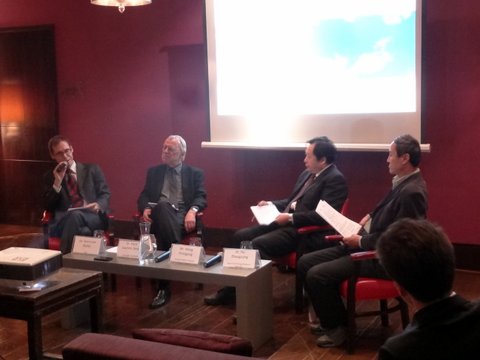
The Panel – From Left: Dr. Sven-Uwe Müller (Moderator – GIZ), Dr. Hans-Joachim Ziesing (Expert Commission to monitor Germany’s ‘Energiewende’), Mr. Wang Zhongying (Energy Research Institute), Dr. Hu Zhaoguang (State Grid Energy Research Institute)
Germany is well placed to achieve the ambitious goals of its National Energy Transition (Energiewende in German), yet a number of implementation challenges must be overcome, including – energy security (reducing energy imports); diversifying energy supply while phasing out nuclear power; gaining collective agreement on how to achieve the established targets, policies and measures; and, communicating the economic advantages to the broader community.
China’s environmental targets and low carbon pilot regions are two major efforts to restructure towards green economy, creating many opportunities for bilateral cooperation on energy planning and energy technologies. The lessons learned through ‘Energiewende’, over time, can help make China’s eventual energy transition an easier one. For the recored of discussion and an executive summary CCF’s panel with Dr. Sven-Uwe Müller (Moderator – GIZ), Dr. Hans-Joachim Ziesing (Expert Commission to monitor Germany’s ‘Energiewende’), Mr. Wang Zhongying (Energy Research Institute), and Dr. Hu Zhaoguang (State Grid Energy Research Institute), download PDF: A National Energy TransitionÂ

